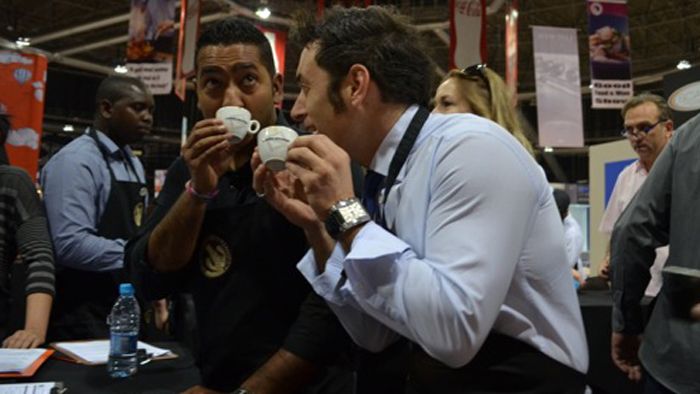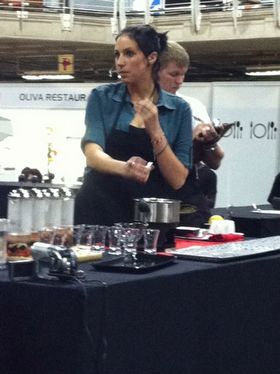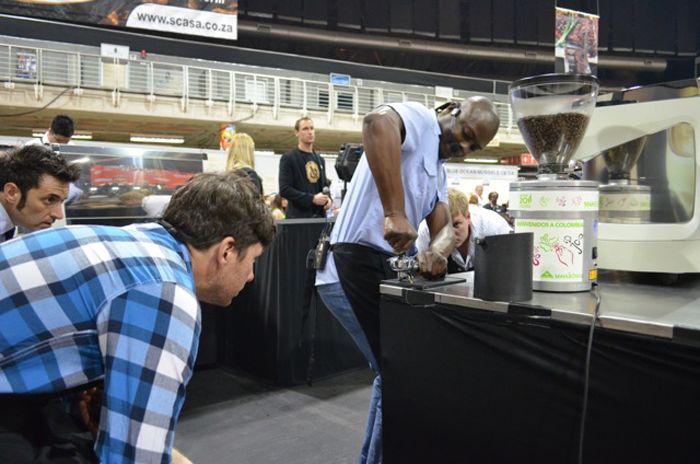 By Zane Mattisson
By Zane Mattisson
ENTERING YOUR FIRST REGIONAL BARISTA COMPETITION? START HERE...
Firstly, well done on making the decision to compete. You have no idea how much you are going to learn (if you are open to learning that is) for your day-to-day coffee career or hobbie!
Loads to cover so let's jump into it:
1. Expectations.
What are your expectations? Be realistic. We have seen amazing baristi, new to the competition, come through year after year who enter, don't do as well as they thought they should do, bitch and moan and blame everyone else including the "incapable judges" and never come back. It's a pity. We have seen lovely competitors come and compete just to learn to improve themselves, and they all leave with loads more than they expected. Some do even better than expected and make the top 6 placings for their region.
2. Judging, Rules and Regulations.
SCASA is the Specialty Coffee Association of South Africa. We live by and uphold the international World Coffee Events standards in South Africa. Specifically with regards to the longest-standing coffee competition, the World Barista Championships (WBC), SCASA has been hosting the SA regional and national competitions each year since the initial SA national competition back in 2007 to find SA's winner to go and represent us on the world stage.
Regarding the judging, we have several WBC certified judges and several other judges who have been judging for several years now. Even though we try to improve year-on-year, we are doing a great job of structurally critiquing each barista competitor on their performances not only to help improve their individual skills, but the SA industry as a whole. Many hours and financial contributions have been invested into hosting each competition, ad to improve on the previous years' competitions.
The judges may look scary during your performance, but just remember they're people too ;)
This leads us to the Rules and Regulations. Please go to
worldbaristachampionship.com, download and read through the rules and score sheets. We, the lovely and kind people running each event, run a Q&A session before each competition to read through these rules with you and answer any questions you have. This is a competition. Please know what it's about, what you are allowed to do and not allowed to do BEFORE coming to this session. Please come with questions, any questions. No questions are stupid questions, we want to help you understand every area of what you need to do. (We cannot give you assistance with coffees to use, when to do what, if you should use this over that, etc - please keep questions to the rules and not your competition set)
Read the rules then go and search for
WBC barista competitions on YouTube. Watch WHAT they do, HOW they do things and listen to WHY they are doing them. Are they merely saying things for the sake of saying them? Is there anything they are doing unnecessary? Or are they doing too little?
3. Score sheets.
Please know and examine your score sheets. Some areas are worth more than others. You will notice some scores are going to be multiplied by 4 for each judge. They are worth more than other things that are only worth 1 point. Focus on these.
4. Technical side of your presentation.
Be clean and tidy. Practice working with a clean, unbroken flow between the things you are doing. You should seem at ease with what you are doing generally and with your presentation specifically. Print out the technical score sheet and get a colleague or friend to watch you work and critique you according to it. The technical score sheet is not subjective; it's a matter of you did what is on it or you didn't. Easy points. Save your concerns for the other side of the scoring...the sensory side.
5. Sensory section.
First thing to note are the number of sensory judges there are in relation to technical judges. Yip. Twice as many sensory judges. And looking at the total available points on each sheet, 168 for each sensory sheet and 71 for each technical sheet, there are far more available points available in the sensory side. Why? Because this is a coffee competition and even though a well-rounded barista is sort after to represent SA (see point 7 below), its about great tasting, sensorially-appealing coffee.
6. Espresso, Cappuccino and Signature drink sections (including presentation)
i. Espresso & Cappuccino sections:
Choose your coffee wisely. WHY are you wanting to use that coffee? You have 15 minutes to produce 4 single espresso, 4 cappuccino and 4 signature drinks, while introducing yourself and your coffee, while getting your reason for that presentation with that coffee across. But once again, it's about the coffees taste, mouthfeel, aroma, visual appeal. Make that the basis for why you are in front of the friendly and lovely 7 judges (including the head judge).
For any part of the presentation, merely repeating the rules to the judges as reasons for using that coffee or doing something in your presentation will not help you much. You may think that you are telling the judges about your coffee but you aren't really. So rather than repeating things like "now I'm going to steam my milk to 70 degrees so as not to burn my milk..." rather tell us why you are in coffee. Why that coffee "speaks" to you. What excites you about this industry.
Jamie Braun in action!
Make your performance personal. With your story. Whether simple or something small please make it about you. Add some soul and substance. I've seen a few great performances with good coffee drinks served but the presentation was not theirs. There was no personal conviction about why they were there. Along with making it personal, address the judges who are assessing you over the crowd.
Regarding flavors/aromas and the experience of drinking each beverage, please give the judges a verbal expectation of what to expect prior to pouring the drinks. It shows knowledge of the equipment and your coffees, adds to your overall professionalism and presentation. Bonus tip: test how your espressos are pouring in your prep time, and taste them to see if they still taste how you remember them to be. Communicate this to the judges. They'll love it and your marks (if the coffees are great) will reflect this.
Lastly, check the size of your cups please. Measure them. Easy points to gain (or lose).
ii. Signature drink section:
Yay, my favourite (please note HUGE sarcasm). This is a very subjective section. What one person loves the next hates. Or they will all love or hate it. Although subjective, follow the rules. But get creative; don't just add chocolate for the chocolate flavors, or berries for the berry flavors. Try add something to highlight one aspect of the coffee; i.e. adding something sweet might bring out the sweetness of the coffee (same highlights same), or you may find something that masks something to bring out another clear aspect.
Please try and prepare as much as possible on stage. If you have a chocolate sauce, try and melt chocolate. If you end off with loads of time but say you couldn't make the sauce, etc on stage then the judges will pick that up.
It can be very complicated or very simple and yet still work well. In the last few years at the World Champs I have seen amazing examples of both complicated and simple signature drinks (and presentations) that got them into the top 6 overall (complex was WBC2011 champion
Michael Phillips, USA, and kept simple yet effective was WBC2012 fourth place
Colin Harmon, Ireland).
7. What is a well-rounded barista champion?
So what are the proverbial "we" looking for in a winner? Here is a non-exhaustive list (as per the WBC definition in the official rules and regulations, section 12.1). The judges are looking for a champion who:
A. Has a mastery of technical skills, craftsmanship, communication skills and service skills and is passionate about the barista profession;
B. Has a broad understanding of coffee knowledge beyond the twelve drinks being served in the competition;
C. Prepares and serves high quality beverages; and
D. May serve as a role model and a source of inspiration for others.
Lovejoy Chirambasukwa, our SA Barista Champ
In closing, have FUN and remember to breath. The judges appreciate your willingness to come and present your performance and coffees to them. They are on your side ;) Any other judges out there reading this, please add some structural pointers I've left out below.
The floor is open! Any other advice for budding barista champs out there?
 By Zane Mattisson
By Zane Mattisson

